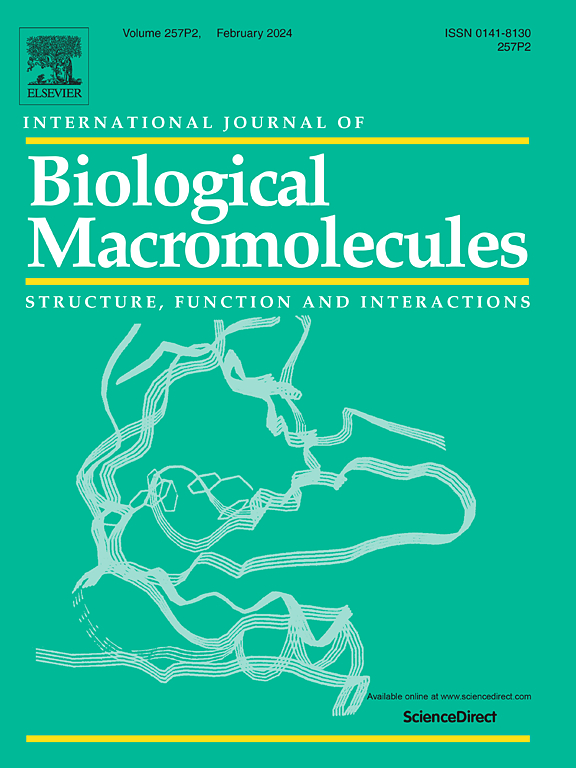Hydrophilic magnetic chitosan/gelatin hydrogel with enhanced fuel dehydration characteristics: Modeling, kinetic, isotherm and thermodynamic study
IF 7.7
1区 化学
Q1 BIOCHEMISTRY & MOLECULAR BIOLOGY
International Journal of Biological Macromolecules
Pub Date : 2025-02-01
DOI:10.1016/j.ijbiomac.2024.138812
引用次数: 0
Abstract
In this research, a nanocomposite of Fe3O4/chitosan/gelatin was prepared and used as a magnetic recyclable dewatering agent to improve the quality of fuel. Prepared materials were characterized by XRD, FT-IR, VSM, BET and FESEM techniques. Effective factors on water uptake i.e., initial water content, time, percentage of Fe3O4 and adsorbent dosage were optimized with Box-Behnken design and results showed that all parameters are significant. The performances of three magnetic composites including crosslinked chitosan, functionalized chitosan and chitosan/gelatin showed that magnetic chitosan/gelatin with 13 % of Fe3O4 content has a removal percentage of 99.2–97.3 % besides the efficiencies were 35.8–43.8 % and 79.5–89 % using crosslinked chitosan, functionalized chitosan as adsorbents. Results from the kinetic study showed that pseudo – second-order model can better describe water uptake moreover, the adsorption process followed the Langmuir isotherm model. Magnetic chitosan/gelatin composite shows a maximum water removal efficiency of 97.3 % at an initial water concentration of 2500 mgL−1 after 40 min. The thermodynamic study showed that adsorption is a spontaneous process with higher feasibility at higher temperatures. Moreover, the adsorbent shows a good efficiency of 93.7 % after 6 recycling. These results confirmed good performances of the prepared hydrogel in dehydration to improve the quality of fuel.
具有增强燃料脱水特性的亲水磁性壳聚糖/明胶水凝胶:建模、动力学、等温线和热力学研究。
本研究制备了Fe3O4/壳聚糖/明胶纳米复合材料,并将其用作磁性可回收脱水剂,以提高燃料质量。采用XRD、FT-IR、VSM、BET和FESEM等技术对制备的材料进行了表征。采用Box-Behnken设计优化了初始含水量、时间、Fe3O4掺量和吸附剂投加量对吸水性的影响,结果表明各参数均显著。对交联壳聚糖、功能化壳聚糖和壳聚糖/明胶三种磁性复合材料的性能进行了研究,结果表明,当磁性壳聚糖/明胶的Fe3O4含量为13 %时,其去除率为99.2 ~ 97.3% %,而以交联壳聚糖、功能化壳聚糖为吸附剂的Fe3O4去除率分别为35.8 ~ 43.8 %和79.5% ~ 89 %。动力学研究结果表明,准二级吸附模型能较好地描述吸附过程,吸附过程符合Langmuir等温线模型。在初始水浓度为2500 mg -1时,经过40 min,磁性壳聚糖/明胶复合材料的最大去除率为97.3% %。热力学研究表明,吸附是一个自发过程,在较高的温度下具有较高的可行性。经过6次循环,吸附剂的吸附剂回收率为93.7 %。这些结果证实了所制备的水凝胶具有良好的脱水性能,可以提高燃料的质量。
本文章由计算机程序翻译,如有差异,请以英文原文为准。
求助全文
约1分钟内获得全文
求助全文
来源期刊
CiteScore
13.70
自引率
9.80%
发文量
2728
审稿时长
64 days
期刊介绍:
The International Journal of Biological Macromolecules is a well-established international journal dedicated to research on the chemical and biological aspects of natural macromolecules. Focusing on proteins, macromolecular carbohydrates, glycoproteins, proteoglycans, lignins, biological poly-acids, and nucleic acids, the journal presents the latest findings in molecular structure, properties, biological activities, interactions, modifications, and functional properties. Papers must offer new and novel insights, encompassing related model systems, structural conformational studies, theoretical developments, and analytical techniques. Each paper is required to primarily focus on at least one named biological macromolecule, reflected in the title, abstract, and text.

 求助内容:
求助内容: 应助结果提醒方式:
应助结果提醒方式:


